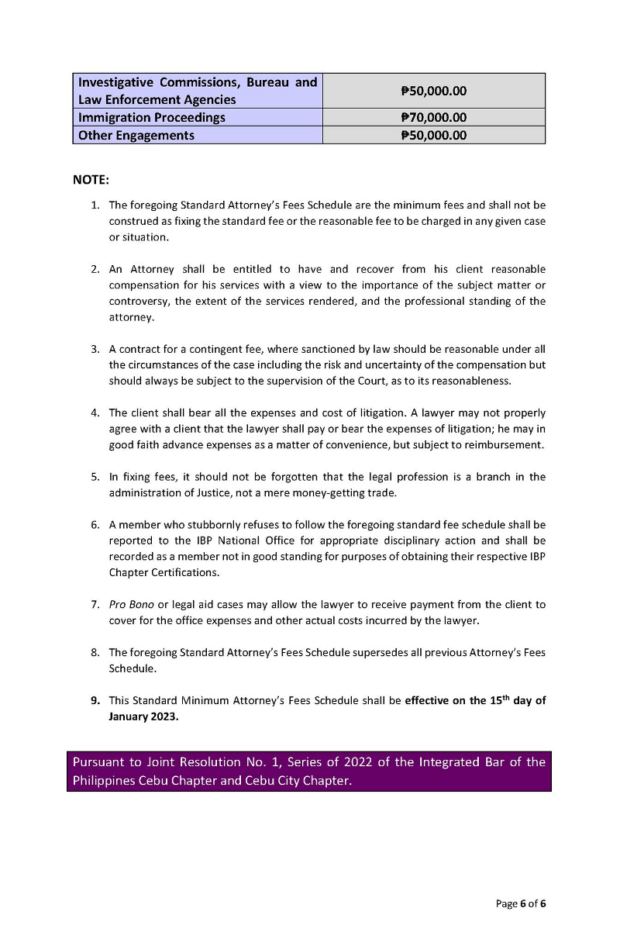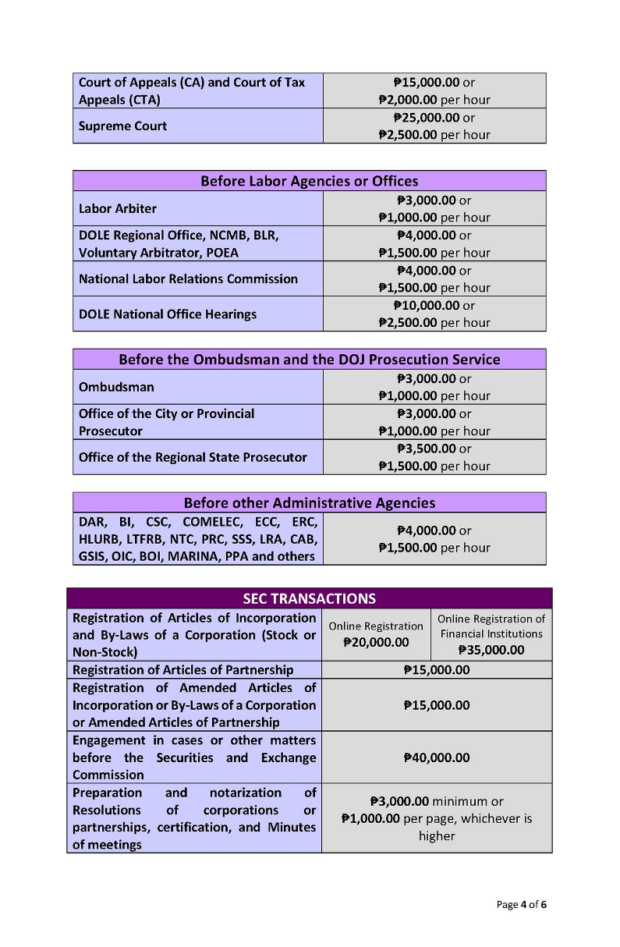Minimum wage for lawyers and understanding legal fees
For the period 1941 to 2022, there are 84,187 lawyers listed in the Roll of Attorneys in the Philippines. (https://sc.judiciary.gov.ph/lawyers-list-2/)
There are many reasons why people seek legal assistance from lawyers. The most common would be for the preparation of various legal documents such as affidavits of loss, deeds of sale, affidavits of consent, and other documents that are required to be notarized. Yes, a Notary Public is a lawyer.
Business people also require the services of lawyers to navigate the intricacies of corporate matters, and of course, those facing criminal cases will need the assistance of a criminal defense lawyer.
As lawyers, one of the first questions we are asked by potential clients is how much our consultation or legal fees are.
Clients may not realize this, but determining legal fees often poses a challenging task for lawyers. We follow the dictates of market forces, i.e. to think of the legal fees that a client is willing to pay for a particular set of legal services. A lawyer that sets their legal fees too high will find themselves with no clients, while a lawyer who sets their legal fees too low will find themselves overwhelmed with a heavy workload and responsibilities without proper compensation.
A few years back, a few chapters of the Integrated Bar of the Philippines (IBP) resolved to come up with standardized minimum fees for lawyers belonging to their chapters.
An example of an IBP Chapter that has come out with Standard Minimum Attorney’s Fees Schedule for its chapter members is that of the IBP Cebu and Cebu City Chapter which is shown below.

The fee schedule reminds its member lawyers that the rates are the minimum fees and, at the same time, that the legal profession is a branch in the administration of justice, and not a “mere-money getting trade”. Though it does mention that members who stubbornly refuse to follow the suggested fees shall be reported to the IBP National Office for appropriate disciplinary action, and shall be recorded as a member who is not in good standing for the purpose of obtaining their respective IBP Chapter Certifications.
The IBP Cebu and Cebu City Chapter are not alone in coming up with fee schedules for its members. Other chapters such as those of Davao City, Bohol, Iloilo, and Baguio-Benguet, among others, have also come up with their own fee schedules.
The Supreme Court reminds lawyers to charge only fair and reasonable fees, and, in its recently issued Code of Professional Responsibility and Accountability last April 11, 2023 (A.M. No. 22-09-01-SC), Cannon III, Section 41 provides:
Section 41. Fair and reasonable fees. — A lawyer shall charge only fair and reasonable fees.
Attorney’s fees shall be deemed fair and reasonable if determined based on the following factors:
(a) The time spent and the extent of the service rendered or required;
(b) The novelty and difficulty of the issues involved;
(c) The skill or expertise of the lawyer, including the level of study and experience required for the engagement;
(d) The probability of losing other engagements as a result of acceptance of the case;
(e) The customary charges for similar services and the recommended schedule of fees, which the IBP chapter shall provide;
(f) The quantitative or qualitative value of the client’s interest in the engagement, or the benefits resulting to the client from the service;
(g) The contingency or certainty of compensation;
(h) The character of the engagement, whether limited, seasonal, or otherwise; and
(i) Other analogous factors.
It is understandable that some IBP chapters have come up with suggested standard minimum fees considering that legal fees could be a sensitive topic to discuss between lawyers and their clients. There are also lawyers who are unsure of the current going rate for particular legal services. Moreover, there are some clients who find it difficult to accept the concept that lawyering is a profession and a livelihood.
Most lawyers have encountered clients who are of the impression that since the legal advice given by lawyers are from stock knowledge, the service or work done are not valuable commodities which lawyers are entitled to be compensated for.
This is especially true these days with the advent of social media and the various messaging platforms where clients would message lawyers inquiring about a legal issue or query and expect an answer. There are times when the client will message the lawyer to ask for legal advice, and when the lawyer quotes a fee the client will seem surprised or withdraw by saying “Ah ganun ba? Thank you nalang Attorney.”
There are instances when clients would inquire as to why the legal fees quoted by the lawyer are quite high and seek to lower the fees. Other times, even when there has already been an agreement about the fees, the client would still ask to re-negotiate the legal fees and ask for a discount, in the middle of the engagement.
Needless to say, this puts the lawyer in an difficult position.
In these cases, the minimum fee schedule by some IBP chapters would help lawyers as they can tell their clients that their legal fees are quite reasonable and that their rates are in line with the minimum rates set by the IBP. To lower their fees below a certain level may even expose them to disciplinary measures by the IBP.
On the flipside, it must be pointed out that the setting of legal fees is a personal matter and made on a case-to-case basis. As pointed out in the Supreme Court’s Code of Professional Responsibility and Accountability, the fees charged by a lawyer depends on the experience and reputation of the lawyer, with a more experienced and expert lawyer charging a higher rate, the complexity of the case, the work load of the lawyer and their ability to handle the case alongside other cases they are handling, the existing trust and relationship between the lawyer and the client, as well as other factors.
This author notes that, with regards the minimum fees issued by the IBP Cebu, while most fees are reasonable, some fees for particular services could be on the high side. For example, retainers fees of P25,000 per month for businesses with a capitalization of above P5 million, the Registration of Trademarks at P150,000, and the preparation of sale documents at 3 percent of the value of the contract.
There has been talk also, though not seriously, about the setting of fees by the IBP as being possibly in violation of the Philippine Competition Act or Republic Act No. 10667. The theory is that the setting the legal fees could be an anti-competitive practice, which prevents economic efficiency and free and fair competition in trade, industry, and all commercial economic activities.
In reality, though, the setting of legal fees by IBP chapters are made with the noble intention of balancing the interest of the lawyers and ensuring that lawyers will be adequately compensated allowing them to earn a decent and living wage vis-à-vis the interest of the public who require legal the assistance of lawyers.
This author has not heard of cases of IBP members who have faced disciplinary sanctions for having stubbornly refusing to follow the suggested fee schedule of their chapters. Moreover, since the practice of law is a noble profession, as we have been taught since our law school days, it is not believed that the IBP will object to any lawyer consistently providing pro-bono work, or free legal services.
(To be continued)
(The author, Atty. John Philip C. Siao, is a practicing lawyer and founding Partner of Tiongco Siao Bello & Associates Law Offices, an Arbitrator of the Construction Industry Arbitration Commission of the Philippines, and teaches law at the De La Salle University Tañada-Diokno School of Law. He may be contacted at jcs@tiongcosiaobellolaw.com. The views expressed in this article belong to the author alone.)




